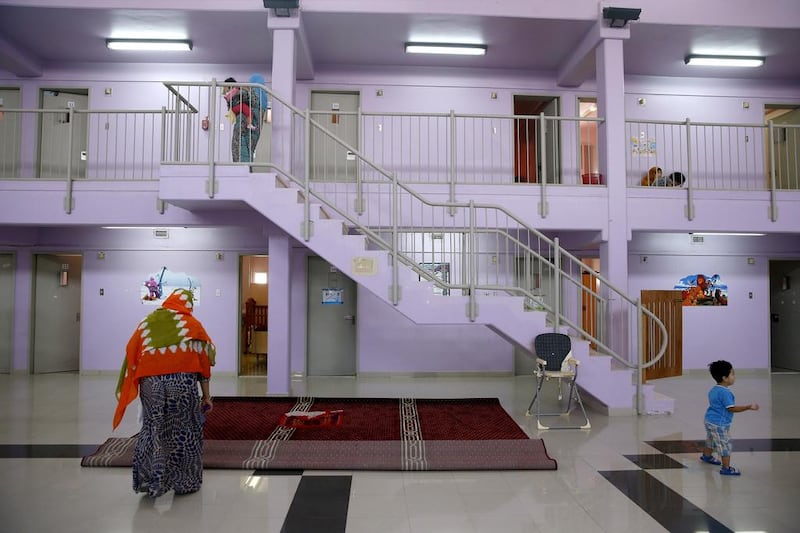In the corner of a large carpeted room with purple walls, a woman wearing a colourful headscarf and matching jalabiya sits cross-legged on the floor, breastfeeding her baby.
Near by, another woman sits on a straw mat, surrounded by children. She is spoon-feeding the youngest two while the others play tag around her.
In the centre of the room is a large dining table with about 20 women, chatting away and eating from platters of rice, fish and chicken. Each has a child either on her lap, sitting on the table or next to her in a highchair.
In spite of all appearances to the contrary, this is not a hotel: it is a prison ward in Mafraq, part of Al Wathba system, and the women are inmates, not guests.
While the concept of prison nurseries is not new – a maximum security women’s prison in New York has had one since 1901 – Mafraq is thought to be the only one that allows women to keep children who are not theirs biologically, with some as old as 12.
“This facility is not for mothers or pregnant women only,” says Capt Noura Rashid, head of female juvenile affairs. “It is for female guardians. If a woman is arrested while in the company of children who have nowhere to go and no one else other than her, then she is allowed to remain with them here.”
S J, a 24-year-old Jordanian, had four children with her when she was arrested in February for entering the UAE illegally.
“Only two of the children are hers, the other two are from her husband’s previous marriage,” Capt Rashid says. “But we allowed her to keep all four because she raised them.”
S J has four months remaining on her sentence, after which she will be deported to Jordan. She is the biological mother of two boys aged 2 and 5, and the stepmother and guardian of two others, aged 11 and 13.
“I fought with my husband because he came home one day and told me he wanted to go back to his first wife and take her children back to her. How dare he,” she says.
SJ packed her things and left Jordan in the middle of the night, with all four children in tow.
“I came to Abu Dhabi through Oman. I rode different taxis all the way. I had no one here but God. No family or friends. I rented a place in Baniyas and was arrested a week later after someone reported me. I’ve raised these children as my own. I’m the only mother they ever knew. How can he take them away from me and give them to her? I do send them to her every week. I never stop them from seeing their mother, but I can’t bear that they be taken from me.”
T S, 24, from Afghanistan, was arrested at the airport with her husband and their two-year-old child when they tried to enter the UAE with illegal documents. She has a month of her three-month sentence to serve.
“You know, it’s great here,” she says. “It is even better than Afghanistan. I would never be able to afford all this stuff they give to my baby. All free here, everything.
“They treat us like family but I miss home. I miss my mother and my in-laws. I tell them we are coming home soon but my mother keeps crying and can’t talk to me.
“My husband is in Sader prison and visits me every week.” Prison authorities allow incarcerated spouses to visit each other.
“I want to come back to the UAE and we will try our best to come back. All is good here – good job, good future.”
The prison nursery falls under the management of Al Wathba prison, and pregnant prisoners are moved to Mafraq when they near their delivery date.
“Because we have the facilities and saw that it was more convenient and comfortable for the women and children to have their own private building, we have housed them here in a separate house at the Mafraq juvenile centre,” said Col Dr Abdullah bu Hindi, director of the Juvenile Care Centre.
There are 29 mothers at the house, with 21 girls and 14 boys under the age of 13. The women, of various nationalities, are imprisoned for misdemeanours such as loitering and theft. The expatriates will be deported to their home countries after completing their sentences.
“Their sentences are usually very short,” Capt Rashid said. “It can be a month or four years but as long as she is in the house, her children will remain with her unless a family member comes forward and asks for the child.
“During their time here we cover all their needs. We provide everything for the children, from clothes to Pampers to formula. Everything is given to the mothers and children.”
Mothers are offered classes in child care, cooking and religion.
The children’s health is tended to at a clinic, and they get vaccines and regular check-ups. Officials even organise events for the children.
“These children have committed no crime and it is never a child’s fault if either of the parents have committed a crime,” Capt Rashid said. “We want them to be happy and try to take them out and organise fun activities for them as often as we can.”
salnuwais@thenational.ae






